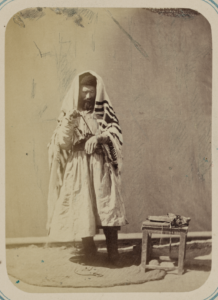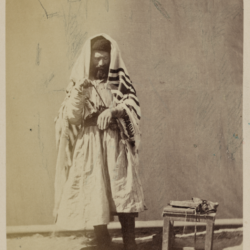In Jewish liturgy, some passages are dəvarim she-bi-qdushah, passages that require public communal prayer. Most famous among these are the Qaddish, Barkhu, and Qədushah. But people are not always able to pray in a community! In liturgical history both ancient and modern many different tashlumim (replacements) for these texts when praying individually have been suggested. The following is the Qaddish Y’hei Shmeih after Shaḥarit for an individual from Seder Rav ȝAmram, the oldest known full siddur. Much of the content of these tashlumim is from the hekhalot literature or the Gemara, often demonstrating girsaot not otherwise known.
Note: “The CAUSE” is used to translate the Divine Name YHVH, based on the philosophical idea of God as the Prime Mover and on the interpretation of the Name as a causative form of the copula – “causes to be.” This translation also uses the plural pronouns They/Their/Them to refer to God as a pluralis majestatis, and to avoid the implications of God being assigned a gender. (Find Ibn Ezra’s commentary on Genesis 1:1 for a discussion of the pluralis majestatis when referring to God.) All divine referents (pronouns, epithets, names) are rendered in unicase.
| Source (Hebrew) | Translation (English) |
|---|---|
תַּנְיָא אָמַר רַבִּי, וְהִתְגַּדִּלְתִּי֙ וְהִתְקַדִּשְׁתִּ֔י וְנ֣וֹדַעְתִּ֔י לְעֵינֵ֖י גּוֹיִ֣ם רַבִּ֑ים וְיָדְע֖וּ כִּֽי־אֲנִ֥י יְהֹוָֽה׃ (יחזקאל לח:כב) |
It was taught in a baraita, Rabbi said, “And I will be magnified and sanctified and made known in the eyes of the many nations, and they will know that I am the Cause” (Ezekiel 38:23).[1] “Rabbi” without a name generally refers to R. Yehuda ha-Nasi, who (to the editor’s knowledge) is nowhere else cited as reciting this verse. |
תַּנְיָא אָמַר רַבִּי יוֹסֵי, פַּֽעַם אַחַת נִכְנַֽסְתִּי לְחוּרְבָּה אַחַת מֵחוּרְבוֹת יְרוּשָׁלַֽיִם לְהִתְפַּלֵּל וּבָא אֵלִיָּֽהוּ זָכוּר לַטּוֹב וְשָׁמַר לִי עַל־הַפֶּֽתַח עַד־שֶׁסִּייַּֽמְתִּי תְּפִלָּתִי. לְאַחַר שֶׁסִּייַּֽמְתִּי תְּפִלָּתִי אָמַר לִי, שָׁלוֹם עָלֶֽיךָ רַבִּי! וְאָמַרְתִּי לוֹ, שָׁלוֹם עָלֶֽיךָ רַבִּי וּמוֹרִי! וְאָמַר לִי, בְּנִי! מִפְּנֵי מָה נִכְנַֽסְתָּ לְחוּרְבָּה זוֹ? אָמַֽרְתִּי לוֹ, לְהִתְפַּלֵּל. אָמַר לִי, הָיָה לְךָ לְהִתְפַּלֵּל בַּדֶּֽרֶךְ! אָמַרְתִּי לוֹ, מִתְיָרֵא הָיִֽיתִי שֶֽׁמָּא יַפְסִיקֽוּנִי עוֹבְרֵי דְּרָכִים. וְאָמַר לִי, הָיָה לְךָ לְהִתְפַּלֵּל תְּפִלָּה קְצָרָה! בְּאוֹתָהּ שָׁעָה לָמַֽדְתִּי הֵימֶּֽנּוּ שְׁלֹשָׁה דְּבָרִים, לָמַֽדְתִּי שֶׁאֵין נִכְנָסִין לְחוּרְבָּה, וְלָמַֽדְתִּי שֶׁמִּתְפַּלְּלִין בַּדֶּֽרֶךְ, וְהַמִּתְפַּלֵּל בְּדֶֽרֶךְ מִתְפַּלֵּל תְּפִלָּה קְצָרָה׃ אָמַר לִי, בְּנִי, מָה קוֹל שָׁמַֽעְתָּ בְּחוּרְבָּה זוֹ? אָמַֽרְתִּי לוֹ, שָׁמַֽעְתִּי בַּת־קוֹל שֶׁמְּנַהֶֽמֶת כְּיוֹנָה וְאוֹמֶֽרֶת, אוֹי שֶׁהֶחֱרַֽבְתִּי אֶת־בֵּיתִי וְשָׂרַֽפְתִּי אֶת־הֵיכָלִי וְהִגְלֵֽיתִי אֶת־בָּנַי לְבֵין אוּמּוֹת הָעוֹלָם! אָמַר, בְּחַיֶּֽיךָ וְחַיֵּי רֹאשְׁךָ לֹא שָׁעָה־זוֹ בִּלְבַד אוֹמֶֽרֶת כָּךְ אֶֽלָּא בְּכׇל־יוֹם וָיוֹם שְׁלֹשָׁה פְּעָמִים אוֹמֶֽרֶת כָּךְ! וְלֹא עוֹד אֶֽלָּא בְּשָׁעָה שֶׁיִּשְׂרָאֵל נִכְנָסִין לְבָתֵּי כְּנֵסִיּוֹת וּלְבָתֵּי מִדְרָשׁוֹת וְעוֹנִין אָמֵן יְהֵא שְׁמֵהּ רַבָּא מְבָרַךְ לְעָלַם וּלְעַלְמֵי עָלְמַיָּא יִתְבָּרַךְ, הוּא מְנַעְנֵָעַ בְרֹאשׁוֹ וְאוֹמֵר, אַשְׁרֵי הַמֶּֽלֶךְ שֶׁמְּקַלְּסִין אוֹתוֹ בְּבֵיתוֹ כָּךְ! מַה לּוֹ לָאָב שֶׁהִגְלָה אֶת־בָּנָיו וְאוֹי לָהֶם לַבָּנִים שֶׁגָּֽלוּ מֵעַל שׁוּלְחַן אֲבִיהֶם׃ (בבלי ברכות ג א׳) |
It was taught in a baraita, Rabbi Yosei said, one time I entered one ruin from the ruins of Jerusalem to pray, and Elijah the well-remembered came and guarded me at the entrance until I finished my prayer. After I finished my prayer, he said to me, “Peace be upon you, my rabbi!” and I said to him, “Please be upon you, my rabbi and my teacher!” And he said to me, “My son! Why did you enter this ruin?” I said to him, “To pray.” He said to me, “You could have prayed on the road!” I said to him, “I was afraid that travellers would stop me.” And he said to me, “You could have prayed an abridged prayer!” At that time I learned from him three things. I learned that one does not enter a ruin, and I learned that one prays on the road, and one who prays on the road prays an abridged prayer. He said to me, “My son, what voice did you hear in this ruin?” I said to him, “I heard a divine voice murmuring like a dove and saying, ‘Woe that I destroyed My house and burned My palace and exiled My children to among the universe’s peoples!’” He said, “By your life and your head’s life, not only this time does it say this, but each and every day three times it says this! But what’s more, when Israel enters the synagogues and study-halls and responds, “Amen! May Their great name be blessed for eternity and eternities of eternities! Blessed be.” They nod Their head and say, “Content the Sovereign who is praised such in Their house! How it is for the Parent who exiled Their children, and woe for the children exiled from their Parent’s table!” (Bavli Berakhot 3a) |
אָמַר רַבִּי חֶלְבּוֹ אָמַר עוּלָּא בִּירָאָה, עָתִיד הַקָּדוֹשׁ בָּרוּךְ הוּא לַעֲשׂוֹת מָחוֹל לְצַדִּיקִים בְּגַן־עֵֽדֶן וְהוּא יוֹשֵׁב בֵּינֵיהֶן וְכׇל־אֶחָד מַרְאֶהוּ בְּאֶצְבַּע שֶׁנֶּאֱמַר וְאָמַר֙ בַּיּ֣וֹם הַה֔וּא הִנֵּ֨ה אֱלֹהֵ֥ינוּ זֶ֛ה קִוִּ֥ינוּ ל֖וֹ וְיוֹשִׁיעֵ֑נוּ זֶ֤ה יְהֹוָה֙ קִוִּ֣ינוּ ל֔וֹ נָגִ֥ילָה וְנִשְׂמְחָ֖ה בִּישׁוּעָתֽוֹ׃ (ישעיה כה:ט) |
Rabbi Ḥelbo said that ȝUlla Bira’a said, in the future the blessed Holy One will make a circle-dance for the righteous in the Garden of Eden, and They will sit in their midst, and each one will point to Them with their finger, as it is said, “And he will say on that day, behold our God is this in whom we trusted, who saved us, this is the Cause in whom we trusted, let us celebrate and rejoice in Their salvation!” (Isaiah 25:9) [2] A variant of a midrash found in Taanit 31a |
Notes

“תשלום לקדיש יהא שמיה אחרי שחרית ליחיד (סדר רב עמרם) | Replacement for the Qaddish Y’hei Shmeih after Shaḥarit for an individual praying alone or without a minyan, from Seder Rav ȝAmram” is shared through the Open Siddur Project with a Creative Commons Attribution-ShareAlike 4.0 International copyleft license.




Leave a Reply